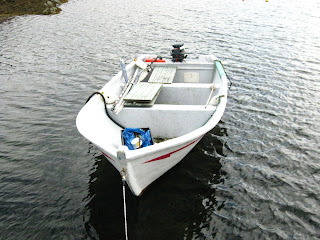When I was about eight years old, my brother caught a bass during an afternoon family canoe trip. He was so excited about his catch that my parents agreed to cook it for suppper that very night, although Dad says now he had his doubts about the quality of the fish. I've always had my reservations about fish, and I was especially squeamish about eating this one. Set on the plate in front me, it smelled awful. It tasted even worse. I gagged violently but, for the sake of my brother's pride, my dad insisted I eat it. It was not a pretty process. (In his defense, he may have thought I was faking the barking gags I was emitting, and he now admits that the fish did taste awful.) As I'm sure you can guess, after this experience in particular, I never welcomed the sight of fish on my dinner plate.
As part of the requirements for our course in Keels, we've all been assigned specific traditions to document. Luck of the draw: I was assigned salt cod. I wasn't too enthused about it. However, the more I've learned about the process--and it's come up quite a lot this past week in Keels--the more fascinating it has become.
Today I talked to June Fitzgerald, lifelong resident of Keels, who has been showing us how to make salt cod from the fish we split last Monday (see blog post from Sept 10, 2012, "When Cod Was King"). He's been making salt cod all his life, and his father and grandfather before him. He tells me he does salt cod the "old fashioned way." Others often let the fish dry for only a day and then lay it up in their freezer. When June is done with his fish, it can be stored anywhere for however long is necessary. Our split cod has been sitting in his store, layered in coarse salt for nearly eight days. This afternoon, June pulled the cod out of the salt, filled a bin from the hose, and scrubbed the backs of the fish (the skin side). He flipped them over and showed me how to wash off the meaty side, then I transferred it over to his "flake," a wooden frame with chicken wire stretched over it, set up on sawhorses in his backyard. Fortunately for squeamish me, the fish was only marginally slimy. Now it will sit out in the sun for three or four days.
Photos: Meghann Jack
As we went through the steps, he told me how he caught his own cod, which was already dried and being stored away as he spoke to me. He's even made the boat he uses to catch them, from cutting down the trees for wood to coating it in fibre glass. Now that's a man hankering for salt cod!
When I asked June and his wife, Annie Jane, how they usually eat salt cod, she offered to show me how to prepare it and help me make a meal out of it. And oddly enough, I'm looking forward to that. I'm just that interested in the whole process of making and eating salt cod, I can almost forget my uneasy relationship with fish in general. That, I suppose, is the power of folklore.
 |
| June Fitzgerald's fishing boat. Photo: Alicia |



No comments:
Post a Comment